
lisbeth1
(Read the disclaimer and
start the series. Note that several of
the images were scavenged off the internet. Click on the image to
find its source.)
CHAPTER
I: LISBETH LONGFROCK GOES TO
HOEL FARM
Bearhunter, the big, shaggy old dog at Hoel Farm, sat on the stone step in front of the house, looking soberly around the spacious dooryard.
It was a clear, cold winter's day toward the beginning of spring, and the sun shone brightly over the glittering snow. In spite of the bright sunshine, however, Bearhunter would have liked to be indoors much better than out, if his sense of responsibility had permitted; for his paws ached with the cold, and he had to keep holding them up one after another from the stone slab to keep from getting the "claw ache." Bearhunter did not wish to risk that, because "claw ache" is very painful, as every northern dog knows.
But to leave his post as watchman was not to be thought of just now, for the pigs and the goats were out to-day. At this moment they were busy with their separate affairs and behaving very well,—the pigs over on the sunny side of the dooryard scratching themselves against the corner of the cow house, and the goats gnawing bark from the big heap of pine branches that had been laid near the sheep barn for their special use. They looked as if they thought of nothing but their scratching and gnawing; but Bearhunter knew well, from previous experience, that no sooner would he go into the house than both pigs and goats would come rushing over to the doorway and do all the mischief they could. That big goat, Crookhorn,—the new one who had come to the farm last autumn and whom Bearhunter had not yet brought under discipline,—had already strayed in a roundabout way to the very corner of the farmhouse, and was looking at Bearhunter in a self-important manner, as if she did not fear him in the least. She was really an intolerable creature, that goat Crookhorn! But just let her dare—!
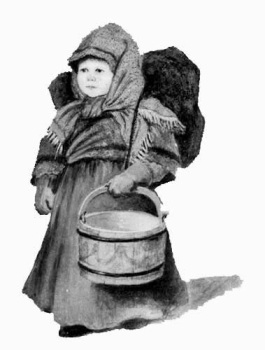 Bearhunter felt that he must sit on the cold doorstep for some time
longer, at any rate. He glanced up the road occasionally as if to see
whether any one was coming, so that the pigs and goats might not think
they had the whole of his attention.
Bearhunter felt that he must sit on the cold doorstep for some time
longer, at any rate. He glanced up the road occasionally as if to see
whether any one was coming, so that the pigs and goats might not think
they had the whole of his attention.
He had just turned his head leisurely toward the narrow road that came down crosswise over the slope from the Upper Farms, when—what in the world was that!
Something was coming,—a funny little roly-poly something. What a pity, thought Bearhunter, that his sight was growing so poor! At any rate, he had better give the people in the house warning.
So he gave several deep, echoing barks. The goats sprang together in a clump and raised their ears; the pigs stopped in the very midst of their scratching to listen. That Bearhunter was held in great respect could easily be seen.
He still remained sitting on the doorstep, staring up the road. Never in his life had he seen such a thing as that now approaching. Perhaps, after all, it was nothing worth giving warning about. He would take a turn up the road and look at it a little nearer. So, arching his bushy tail into a handsome curve and putting on his most good-humored expression, he sauntered off.
Yes, it must be a human being, although you would not think so. It began to look very much like "Katrine the Finn," as they called her, who came to the farm every winter; but it could not be Katrine—it was altogether too little. It wore a long, wide skirt, and from under the skirt protruded the tips of two big shoes covered with gray woolen stocking feet from which the legs had been cut off. Above the skirt there was a round bundle of clothes with a knitted shawl tied around it, and from this protruded two stumps with red mittens on. Perched on the top of all was a smaller shape, muffled up in a smaller knitted shawl,—that, of course, must be the head. Carried at the back was a huge bundle tied up in a dark cloth, and in front hung a pretty wooden pail, painted red.
Really, Bearhunter had to stand still and gaze. The strange figure, in the meantime, had become aware of him, and it also came to a standstill, as if in a dilemma. At that, Bearhunter walked over to the farther side of the road and took his station there, trying to look indifferent, for he did not wish to cause any fright. The strange figure then made its way carefully forward again, drawing gradually closer and closer to its own side of the road. As it came nearer to Bearhunter the figure turned itself around by degrees, until, when directly opposite to him, it walked along quite sidewise.
Then it was
that Bearhunter got a peep through a little opening in
the upper shawl; and there he saw the tip of a tiny, turned-up red
nose, then a red mouth that was drawn down a little at the corners as
if ready for crying, and then a pair of big blue eyes that were
fastened upon him with a look of terror.
 Pooh! it was nothing, after
all, but a little girl, well bundled up
against the cold. Bearhunter did not know her—but wait a bit! he
thought he had seen that pail before. At any rate it would be absurd to
try to frighten this queer little creature.
Pooh! it was nothing, after
all, but a little girl, well bundled up
against the cold. Bearhunter did not know her—but wait a bit! he
thought he had seen that pail before. At any rate it would be absurd to
try to frighten this queer little creature.
His tail began to wag involuntarily as he walked across the road to take a sniff at the pail.
The little girl did not understand his action at once. Stepping back in alarm, she caught her heels in her long frock and down she tumbled by the side of the road. Bearhunter darted off instantly; but after running a short distance toward the house he stopped and looked at her again, making his eyes as gentle as he could and wagging his tail energetically. With Bearhunter that wagging of the tail meant hearty, good-natured laughter.
Then the little girl understood. She got up, smiled, and jogged slowly after him. Bearhunter trotted leisurely ahead, looking back at her from time to time. He knew now that she had an errand at Hoel Farm, and that he was therefore in duty bound to help her.
Thus it was that Lisbeth Longfrock of Peerout Castle made her entrance into Hoel Farm.
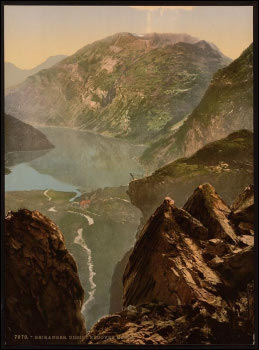 Peerout Castle was perched
high above the Upper Farms, on a crag that
jutted out from a barren ridge just under a mountain peak called "The
Big Hammer." The real name of the little farm was New Ridge, and
"Peerout Castle" was only a nickname given to it by a joker because
there was so fine an outlook from it and because it bore no resemblance
whatever to a castle. The royal lands belonging to this castle
consisted of a little plot of cultivated soil, a bit of meadow land
here and there, and some heather patches where tiny blueberry bushes
and small mountain-cranberry plants grew luxuriantly. The castle's
outbuildings were a shabby cow house and a pigsty. The cow house was
built against the steep hillside, with three walls of loosely built
stone, and its two stalls were dug half their length into the hill. The
tiny pigsty was built in the same fashion.
Peerout Castle was perched
high above the Upper Farms, on a crag that
jutted out from a barren ridge just under a mountain peak called "The
Big Hammer." The real name of the little farm was New Ridge, and
"Peerout Castle" was only a nickname given to it by a joker because
there was so fine an outlook from it and because it bore no resemblance
whatever to a castle. The royal lands belonging to this castle
consisted of a little plot of cultivated soil, a bit of meadow land
here and there, and some heather patches where tiny blueberry bushes
and small mountain-cranberry plants grew luxuriantly. The castle's
outbuildings were a shabby cow house and a pigsty. The cow house was
built against the steep hillside, with three walls of loosely built
stone, and its two stalls were dug half their length into the hill. The
tiny pigsty was built in the same fashion.
As for the castle itself, that was a very, very small, turf-roofed cabin lying out on the jutting crag in the middle of the rocky ridge. It had only one small window, with tiny panes of glass, that looked out over the valley. And yet, in whatever part of the surrounding country one might be, by looking in that direction—and looking high enough—one could always see that little castle, with its single window peering out like a watchful eye over the landscape.
Since the castle from which Lisbeth Longfrock came was no more magnificent than this, it may easily be understood that she was no disguised princess, but only a poor little girl. Coming to Hoel Farm for the first time was for her like visiting an estate that was, in very truth, royal; and besides, she had come on an important "grown-up" errand. She was taking her mother's place and visiting Hoel as a spinning woman.
Lisbeth's mother, whose name was Randi, had worked hard for the last four years to get food for herself and her children up at Peerout Castle. Before that the family had been in very comfortable circumstances; but the father had died, leaving the mother with the castle, one cow, and the care of the two children. The children were Jacob, at that time about six years old, and Lisbeth, a couple of years younger. Life was often a hard struggle for the mother; but they had, at any rate, a house over their heads, and they could get wood without having to go very far for it, since the forest lay almost within a stone's throw.
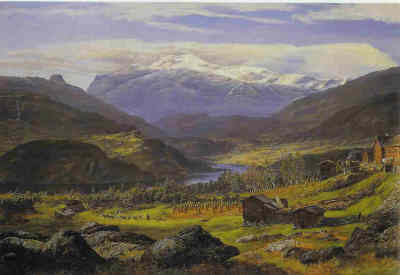 In the summer
Randi managed to dig up her tiny plots of ground after
a fashion, so that she could harvest a few potatoes and a little grain.
By cutting grass and stripping off birch leaves she had thus far
managed each year to give Bliros, their cow, enough to eat. And where
there is a cow there is always food.
In the summer
Randi managed to dig up her tiny plots of ground after
a fashion, so that she could harvest a few potatoes and a little grain.
By cutting grass and stripping off birch leaves she had thus far
managed each year to give Bliros, their cow, enough to eat. And where
there is a cow there is always food.
In the
winter she spun linen and wool for the women on the farms far
and near, but as she had lived at Hoel Farm as a servant before she was
married, it was natural that most of her spinning should be for Kjersti
Hoel.
In such ways had Randi been able to care for her family. Meanwhile Jacob, now ten years old, had grown big enough to earn his own living. In the spring before the last a message had come from Nordrum Farm that a boy was needed to look after the flocks, and Jacob had at once applied and been accepted. He and Lisbeth had often knelt on the long wooden bench under the little window at Peerout Castle, and gazed upon the different farms, choosing which they would work on when they were big enough. Jacob had always chosen Nordrum Farm,—probably because he had heard Farmer Nordrum spoken of as the big man of the community; while Lisbeth had always thought that it would be pleasanter at Hoel Farm because it was owned by a woman.
When autumn came Farmer Nordrum had concluded that he would have use for such a boy as Jacob during the winter also, and so Jacob had stayed on. This last Christmas, however, he had gone home for the whole day and had taken with him a Christmas present for his sister from a little girl at Nordrum. The present was a gray woolen frock,—a very nice one.
Jacob had grown extremely pleasant and full of fun while at Nordrum, Lisbeth thought. When she tried the frock on and it reached way down to the ground before and behind, he called her "Lisbeth Longfrock" and Lisbeth Longfrock she had remained from that day.
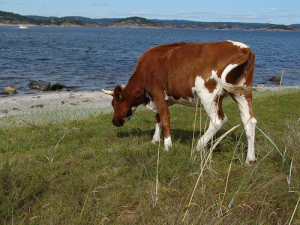 After Christmas, times had been somewhat
harder at Peerout Castle.
Bliros, who generally gave milk the whole year round, had become dry,
and would not give milk for several months. She was to have a calf in
the early summer. During the last few weeks there had not been milk
enough even for Randi's and Lisbeth's coffee.
After Christmas, times had been somewhat
harder at Peerout Castle.
Bliros, who generally gave milk the whole year round, had become dry,
and would not give milk for several months. She was to have a calf in
the early summer. During the last few weeks there had not been milk
enough even for Randi's and Lisbeth's coffee.
To go to Svehaugen, the nearest farm, for milk was no short trip; and milk was scarce ther too, as Randi well knew. Besides, she could not spare the time to go. She had to finish spinning Kjersti Hoel's wool. When she once got that off her hands, they could have plenty of milk for their coffee, and other good things besides. What a relief it would be when that time came!
So Randi worked steadily at her spinning, Lisbeth being now big enough to help in carding the wool. For a week she spun almost without ceasing, scarcely taking time for meals, but drinking a good deal of strong black coffee. Not until very late one evening was Kjersti Hoel's wool all spun and ready. By that time Randi was far from well. Whether or not her illness was caused, as she thought, by drinking so much black coffee, certain it is that when Kjersti Hoel's wool was all spun Randi felt a tightness in her chest, and when she got up the next morning and tried to get ready to go to Hoel with the spinning, she was seized with such a sudden dizziness that she had to go back to bed again. She was too weak for anything else.
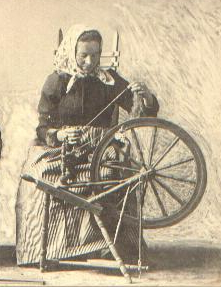 Now it was the custom in Norway for the
spinning woman to take back
to the different farms the wool she had spun, and for the farmers'
wives to praise her work, treat her to something good to eat and drink,
pay her, and then give her directions about the way the next spinning
was to be done. All this Randi would have to give up for the
present—there was no help for it; but she wondered how it would do
to
send Lisbeth to Hoel Farm in her stead. The little girl would find her
way safely, Randi was sure, although Randi had never as yet taken her
to that farm because it was so far off. The payment for the spinning
was to be in eatables as well as money, and Lisbeth could bring home
part of what was due. Then, though they still might lack many things,
their drop of coffee could have cream in it, as coffee ought to have.
The remainder of the payment and the directions for the next spinning
Randi herself could get when she was better.
Now it was the custom in Norway for the
spinning woman to take back
to the different farms the wool she had spun, and for the farmers'
wives to praise her work, treat her to something good to eat and drink,
pay her, and then give her directions about the way the next spinning
was to be done. All this Randi would have to give up for the
present—there was no help for it; but she wondered how it would do
to
send Lisbeth to Hoel Farm in her stead. The little girl would find her
way safely, Randi was sure, although Randi had never as yet taken her
to that farm because it was so far off. The payment for the spinning
was to be in eatables as well as money, and Lisbeth could bring home
part of what was due. Then, though they still might lack many things,
their drop of coffee could have cream in it, as coffee ought to have.
The remainder of the payment and the directions for the next spinning
Randi herself could get when she was better.
If she could only be sure that Lisbeth would behave properly and not act like a changeling, a troll child!
Lisbeth eagerly promised that if her mother would allow her to go she would behave exactly as a spinning woman should,—she would, really! And she remembered perfectly well just how everything was done that time she had gone with her mother to one of the nearer farms.
So Lisbeth put on her long frock, which was used only for very best, and her mother wrapped her up snugly in the two shawls. Then the bundle of yarn was slung over her back, the pail was hung in front, many directions were given to her about the road, and off she started.
And that is the way Lisbeth Longfrock happened to come toddling after Bearhunter to Hoel Farm on that clear, cold winter's day toward the beginning of spring.
To be continued tomorrow....
Want more in-depth information? Browse through our books.
Or explore more posts by date or by subject.
About us: Anna Hess and Mark Hamilton spent over a decade living self-sufficiently in the mountains of Virginia before moving north to start over from scratch in the foothills of Ohio. They've experimented with permaculture, no-till gardening, trailersteading, home-based microbusinesses and much more, writing about their adventures in both blogs and books.
Want to be notified when new comments are posted on this page? Click on the RSS button after you add a comment to subscribe to the comment feed, or simply check the box beside "email replies to me" while writing your comment.

